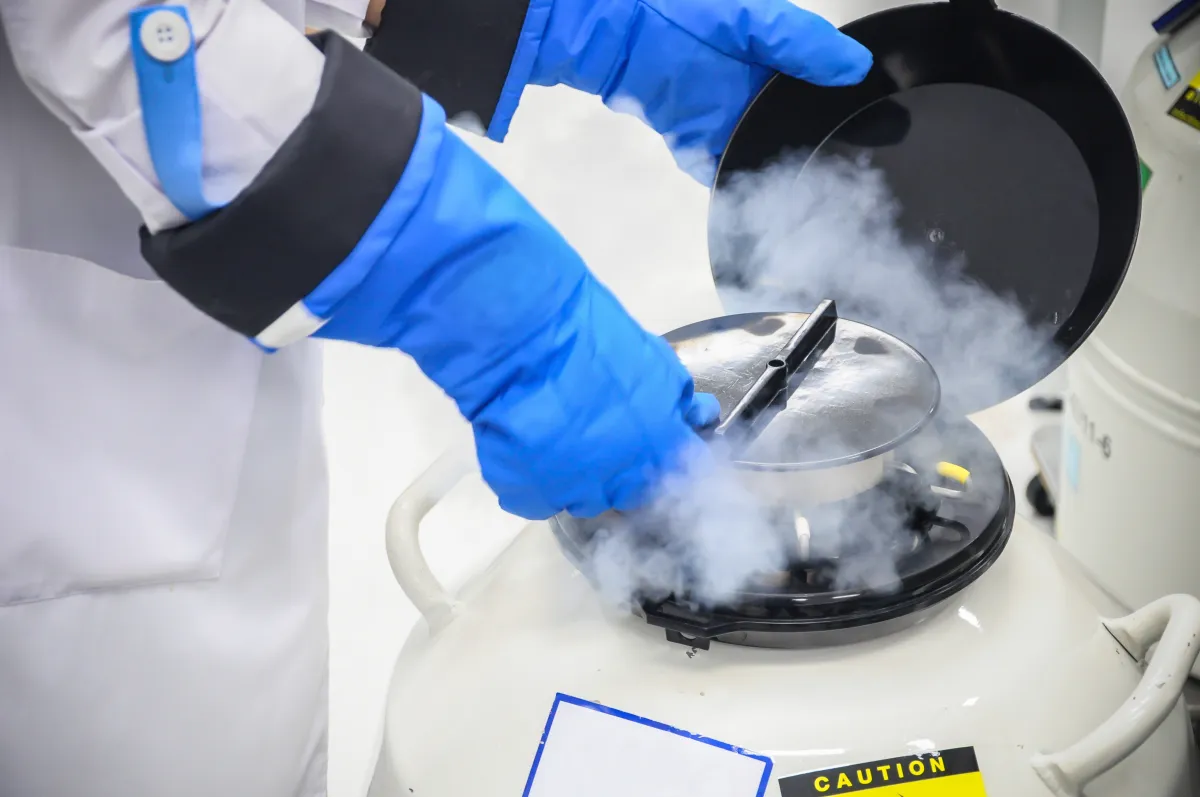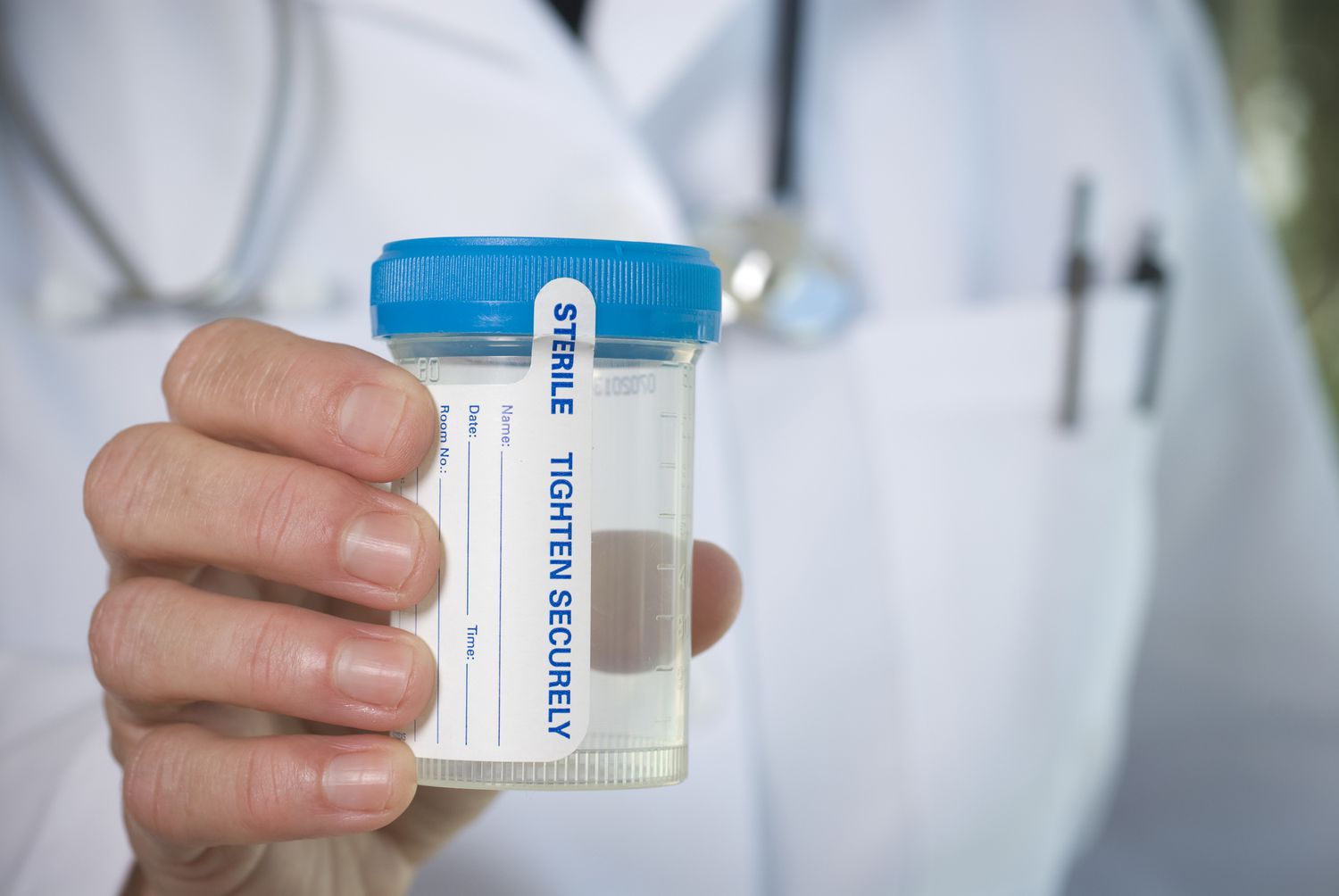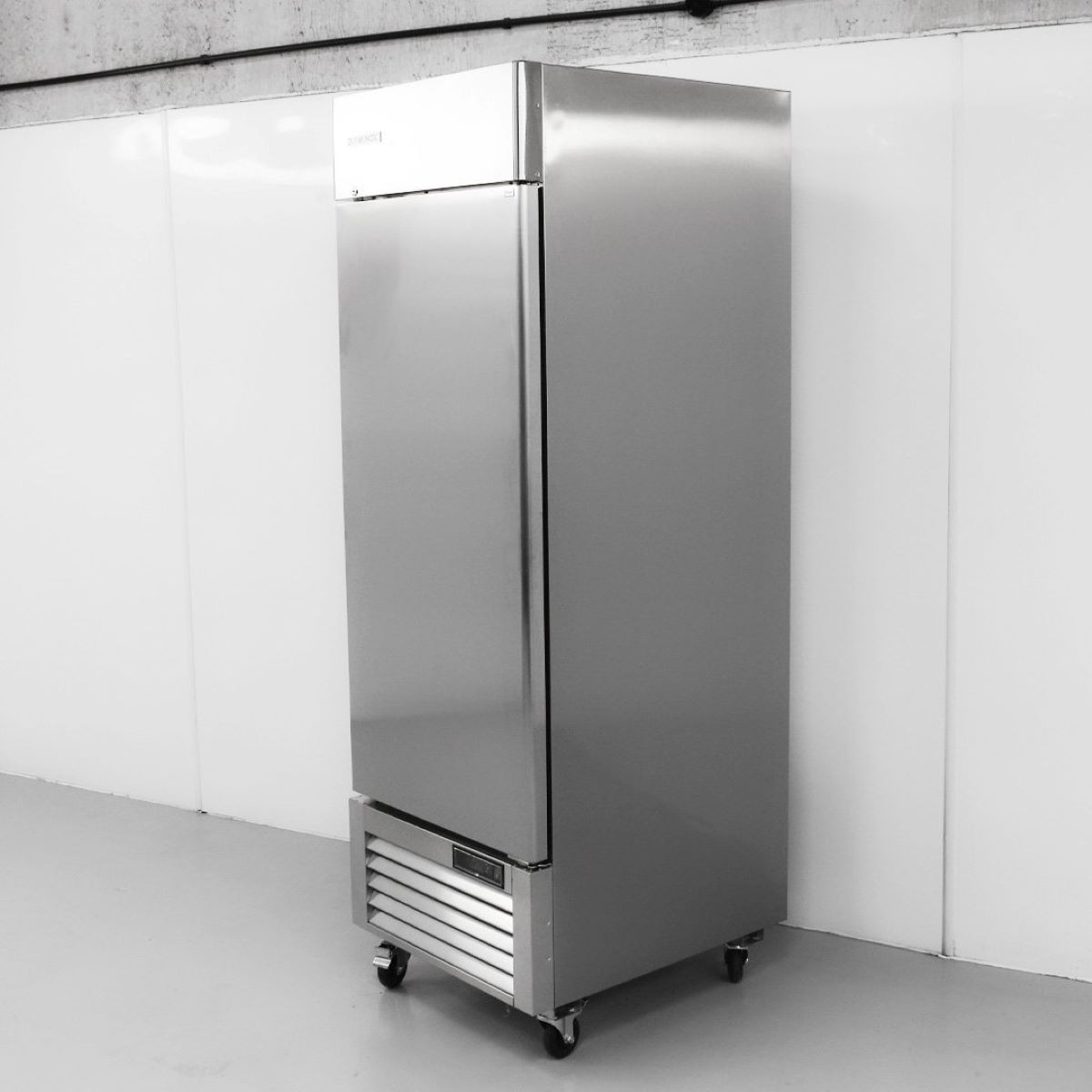

Articles
How To Store Sperm For Future Use
Modified: January 6, 2024
Learn how to store sperm for future use with our informative articles. Discover the best methods and tips for preserving sperm viability.
(Many of the links in this article redirect to a specific reviewed product. Your purchase of these products through affiliate links helps to generate commission for Storables.com, at no extra cost. Learn more)
Introduction
Storing sperm for future use is a topic that is gaining increasing attention and relevance in the field of reproductive medicine. Advancements in technology have enabled individuals and couples to preserve their fertility by freezing and storing sperm for later use. Whether it is due to medical reasons, such as undergoing cancer treatment that may damage fertility, or personal choices, such as wanting to delay parenthood, sperm storage offers a viable solution to maintain the possibility of conception.
There are various reasons why someone may choose to store sperm. One of the most common reasons is for individuals who are facing fertility-threatening treatments, such as chemotherapy or radiation therapy. These treatments can potentially damage sperm production or lead to infertility. By storing sperm prior to treatment, individuals can preserve their reproductive potential and have the option of starting a family in the future.
Another reason for sperm storage is for couples who may be planning to undergo assisted reproductive technologies, such as in vitro fertilization (IVF) or intrauterine insemination (IUI). Sperm storage allows couples to have a readily available supply of sperm for these procedures, reducing the need for multiple collection attempts and providing convenience and peace of mind during the fertility treatment process.
Additionally, sperm storage can be considered by individuals who wish to delay parenthood. Factors such as career aspirations, financial stability, or relationship status may influence the decision to have children at a later stage in life. By freezing sperm at a younger age, individuals can preserve their fertility and have the option of using the stored sperm when they are ready to start a family.
Overall, the ability to store sperm for future use has revolutionized the field of reproductive medicine, offering new possibilities and opportunities for individuals and couples. It provides a sense of security and control over one’s reproductive health, ensuring that fertility is not compromised by medical treatments or personal circumstances. In the following sections, we will explore the steps involved in preparing for sperm storage, the available options for sperm storage, the process of freezing sperm, considerations for choosing a sperm bank, the associated costs, and the legal and ethical aspects to be aware of. Let us delve deeper into the world of sperm storage and uncover the mechanisms that allow the preservation of fertility.
Key Takeaways:
- Sperm storage offers hope and flexibility, empowering individuals and couples to preserve their fertility and plan for the future, overcoming obstacles and aligning with personal circumstances.
- Legal and ethical considerations are vital in sperm storage, ensuring informed consent, privacy, compliance, and ethical practices throughout the process, respecting the rights of all parties involved.
Read more: How To Store Sperm For Later Use
Benefits of Storing Sperm
Storing sperm offers numerous benefits, providing individuals and couples with a range of options for preserving their fertility and planning for the future. Here are some of the key advantages of sperm storage:
- Fertility Preservation: One of the primary benefits of storing sperm is the ability to preserve fertility. For individuals facing fertility-threatening treatments, such as chemotherapy or radiation therapy, sperm storage offers a way to safeguard their reproductive potential. By freezing and storing sperm prior to treatment, they can maintain the possibility of having biological children in the future.
- Flexibility in Family Planning: Sperm storage allows individuals and couples to have more control over their family planning timeline. By freezing sperm at a younger age, individuals can extend their reproductive options and choose to become parents when the timing is right for them. This can be particularly beneficial for those focused on career development, education, or other personal goals.
- Preserving Genetic Material: Storing sperm enables the preservation of genetic material. This can be especially important for individuals with certain genetic conditions or family histories of inherited diseases. By freezing sperm, they can ensure the availability of their genetic material for future use, allowing them to potentially avoid passing on genetic disorders to their children.
- Assisted Reproductive Technologies: Another significant advantage of sperm storage is the facilitation of assisted reproductive technologies (ART). By having a banked supply of frozen sperm, individuals and couples can pursue procedures such as in vitro fertilization (IVF) or intrauterine insemination (IUI) without the need for time-consuming and sometimes stressful sperm collection efforts.
- Peace of Mind: Sperm storage provides peace of mind to individuals and couples who may be concerned about their reproductive future. Whether it is due to a medical condition, undergoing fertility-threatening treatments, or personal circumstances, knowing that they have stored sperm offers reassurance that they have taken proactive steps to preserve their fertility.
These benefits highlight the importance and value of sperm storage as a viable option for fertility preservation and family planning. By taking advantage of this technology, individuals and couples can have greater control over their reproductive choices and ensure that their dreams of starting a family can be realized, no matter the circumstances they may face in the future.
Preparing for Sperm Storage
Before undergoing the process of sperm storage, certain preparations need to be made to ensure a smooth and successful experience. Here are some important steps to consider when preparing for sperm storage:
- Consultation with a Fertility Specialist: The first step in preparing for sperm storage is to schedule a consultation with a fertility specialist or reproductive endocrinologist. They will evaluate your specific circumstances, discuss the reasons for sperm storage, and guide you through the process.
- Semen Analysis: Before storage, a semen analysis will be conducted to assess the quality and quantity of your sperm. This analysis helps to determine the viability of sperm for freezing and storage. If any issues are identified, the fertility specialist may suggest treatments or interventions to optimize sperm quality.
- Abstinence Period: It is important to follow the abstinence guidelines provided by the fertility specialist before providing a sperm sample for storage. Typically, a period of 2 to 5 days of sexual abstinence is recommended to ensure optimal sperm quality and quantity.
- Health Assessment and Screening: To ensure the health and safety of the stored sperm, a comprehensive health assessment and screening will be conducted. This may include testing for infectious diseases such as HIV, hepatitis, and sexually transmitted infections (STIs). The screening also helps to identify any potential genetic or hereditary conditions that could impact the quality of the stored sperm.
- Consent and Legal Documentation: Before proceeding with sperm storage, you will need to provide informed consent and complete any required legal documentation. This ensures that you understand the process, the associated risks and benefits, and your rights and responsibilities regarding the stored sperm.
- Choosing a Sperm Bank: If you have decided to proceed with sperm storage, it is important to carefully choose a reputable sperm bank. Consider factors such as the bank’s experience, success rates, accreditation, and the quality of their facilities. Consult with your fertility specialist for recommendations and research the available options to make an informed decision.
By following these steps and collaborating with your fertility specialist, you can adequately prepare for sperm storage and ensure a smooth and successful process. It is essential to communicate openly and ask any questions you may have to make informed decisions about your fertility preservation journey.
Sperm Storage Options
When it comes to storing sperm, there are different options available depending on individual preferences and circumstances. Here are the most common sperm storage options:
- Private Sperm Bank: Private sperm banks, also known as commercial sperm banks, offer storage services for individuals and couples who wish to preserve their sperm for future use. These banks typically have strict quality control measures, state-of-the-art facilities, and extensive experience in sperm freezing and storage. Private sperm banks often provide the convenience of accessing the stored sperm for use in assisted reproductive technologies or for artificial insemination.
- Fertility Clinic: Some fertility clinics offer sperm storage services for their patients. This option allows individuals seeking fertility treatment to conveniently store their sperm at the same clinic where they receive their reproductive care. Fertility clinics typically have specialized laboratories and equipment for sperm freezing and storage, ensuring proper handling and maintenance of the stored sperm.
- Hospital-based Program: Certain hospitals, particularly those with specialized reproductive medicine departments, may have programs that offer sperm storage services. This option can be beneficial for individuals undergoing medical treatments that may affect their fertility, as they can access both their medical and fertility care within the same healthcare system.
- Academic/Research Institutions: Some academic or research institutions may have sperm repositories or cryobanks where individuals can store their sperm. These institutions often have specialized facilities and expertise in cryopreservation techniques. However, it is important to note that the primary focus of these institutions may be research, and access to the stored sperm for reproductive purposes may be limited.
When selecting a sperm storage option, it is crucial to consider factors such as the reputation and accreditation of the facility, the expertise of the staff, success rates, and the availability of additional services, such as counseling or genetic testing. It is also essential to ensure that the chosen facility complies with all legal and ethical requirements regarding sperm storage.
Consulting with a fertility specialist or reproductive endocrinologist can help guide you in choosing the most suitable sperm storage option based on your specific circumstances and needs. They can provide you with information, resources, and recommendations to assist you in making an informed decision. Remember, the goal is to select a reliable and reputable facility that will ensure the safe and secure storage of your sperm for future use.
Sperm Freezing Process
The process of freezing sperm, also known as cryopreservation, involves several steps to ensure the long-term viability and preservation of the sperm. Here is an overview of the sperm freezing process:
- Sperm Collection: The first step in the sperm freezing process is the collection of a sperm sample. This can be done through masturbation, using a collection condom during sexual intercourse, or via surgical sperm retrieval methods, depending on the individual’s circumstances and needs.
- Semen Analysis: Once the sperm sample is collected, a semen analysis is performed to assess the quality and quantity of the sperm. This analysis helps determine if the sample is suitable for freezing and provides a baseline for future comparisons.
- Sperm Preparation: The sperm sample is then prepared for freezing. This involves removing any seminal fluid or impurities to concentrate the sperm cells. The concentration of the sperm is important as it improves the freezing process and enhances the post-thaw survival rate.
- Cryoprotectant Addition: To protect the sperm cells during the freezing process, a cryoprotectant solution is added to the sperm sample. The cryoprotectant helps prevent ice crystal formation that can damage the sperm cells during freezing and thawing.
- Sperm Freezing: The prepared sperm sample, along with the cryoprotectant, is carefully placed in a freezing container or straw. The container or straw is then slowly cooled using a controlled freezing method, such as liquid nitrogen vapor, to gradually lower the temperature and prevent cell damage.
- Sperm Storage: Once the sperm sample is frozen, it is transferred to a storage device, such as a cryogenic tank or freezer, where it is stored at an extremely low temperature, typically around -196°C (-321°F). This low temperature helps maintain the long-term viability of the stored sperm.
- Record Keeping: Throughout the entire process, detailed records and documentation are maintained, including information about the sperm donor (if applicable), collection details, storage parameters, and any relevant medical history. This documentation is essential for tracking and managing the stored sperm in accordance with regulatory and ethical guidelines.
When it comes time to use the stored sperm, the sample is thawed by gradually raising the temperature to room temperature. The sperm can then be used for various assisted reproductive technologies or artificial insemination procedures, depending on the individual or couple’s needs and treatment plan.
It is important to note that the survival and quality of the sperm post-thaw can vary, and there is no guarantee of success. However, freezing sperm using specialized techniques and proper storage conditions has resulted in high success rates, allowing individuals and couples the opportunity to achieve their fertility goals.
Consulting with a fertility specialist or reproductive endocrinologist will provide you with in-depth information about the sperm freezing process, its success rates, and the specific protocols followed by the chosen sperm storage facility.
Consider cryopreservation, a process where sperm is frozen and stored for future use. It’s important to choose a reputable facility and discuss the process with a healthcare provider.
Choosing a Sperm Bank
Choosing a reputable and reliable sperm bank is crucial when considering sperm storage. The quality of the facility and the services they provide can greatly impact the success and safety of your stored sperm. Here are some key factors to consider when selecting a sperm bank:
- Experience and Reputation: Research the sperm bank’s history and reputation. Look for well-established banks with a track record of success and positive patient experiences. Consider how long they have been in operation and their expertise in the field of reproductive medicine.
- Accreditation and Licensing: Ensure that the sperm bank is accredited by relevant regulatory bodies and adheres to national and international standards. Accreditation ensures that the facility meets stringent quality and safety standards. It is also essential to confirm that the sperm bank holds the necessary licenses and certifications to operate legally.
- Quality Control Measures: Inquire about the sperm bank’s quality control measures. A reputable sperm bank will have strict protocols in place to ensure the highest quality of stored sperm, including proper handling, storage, and record-keeping procedures. Look for banks that regularly perform quality control checks and have robust systems in place to monitor and maintain the stored sperm’s viability.
- Success Rates: Ask about the success rates of the sperm bank in terms of pregnancies and live births resulting from the use of the stored sperm. While success rates can vary depending on individual factors and the specific treatment used, a higher success rate generally indicates a well-functioning and effective sperm bank.
- Available Services: Consider the range of services provided by the sperm bank. In addition to sperm storage, some banks may offer additional services such as genetic testing, counseling, and assistance with assisted reproductive technologies. Having access to these services under one roof can provide added convenience and support throughout your fertility journey.
- Cost and Affordability: Evaluate the cost of sperm storage services at different banks. While cost should not be the sole determining factor, it is important to consider affordability, especially if long-term storage is necessary. Review the pricing structure, any additional fees involved, and whether the bank offers any financial assistance or payment plans.
- Confidentiality and Donor Information: If you are considering using donor sperm, ask about the sperm bank’s policies regarding donor confidentiality and access to donor information. Ensure that the bank follows ethical guidelines and has proper protocols in place to protect donor and patient privacy.
It is also beneficial to seek recommendations from your fertility specialist or reproductive endocrinologist. They can provide insights and guidance based on their knowledge of reputable and reliable sperm banks. Additionally, consider reading reviews and testimonials from other patients who have utilized the services of the sperm banks you are considering.
By thoroughly researching and considering these factors, you can make an informed decision when choosing a sperm bank. Taking the time to select a reputable and reliable facility will provide peace of mind and increase the chances of a successful outcome when using the stored sperm for future reproductive endeavors.
Considerations for Sperm Storage
Before embarking on the process of sperm storage, there are several important considerations to keep in mind. These factors may impact your decision-making and the overall experience of storing sperm for future use:
- Timing: It is advisable to consider sperm storage as early as possible, especially if you anticipate undergoing medical treatments or procedures that may affect your fertility. By starting the process early, you can maximize the quality and quantity of your sperm, increasing the chances of successful storage and future use.
- Family Planning Goals: Reflect on your family planning goals and intentions. Consider factors such as the number of children you envision having and how long you may want to store your sperm. These considerations can help determine how much sperm needs to be stored and the duration of storage required.
- Storage Duration: Different individuals may have varying needs when it comes to the duration of sperm storage. Some may only require short-term storage, while others may need long-term options. Discuss your specific needs and preferences with your fertility specialist to determine the most suitable storage duration for you.
- Insurance Coverage: Check with your health insurance provider to see if sperm storage is covered under your policy. Coverage varies depending on the insurance company and the reason for storing sperm. Some insurance plans may cover sperm storage for medical reasons, such as cancer treatment, while others may not provide coverage at all. Understanding your insurance coverage can help you plan for the associated costs.
- Storage Facility Location: Consider the location of the chosen sperm storage facility. A nearby facility may be more convenient for routine visits or accessing the stored sperm when needed. However, it is essential to prioritize the reputation and quality of the facility over proximity if necessary.
- Storage and Transfers: Inquire about the storage protocols and regulations followed by the sperm bank. Find out how the stored sperm is labeled, tracked, and transferred if you need to move it to a different location in the future. These processes should be conducted with utmost care and adherence to ethical and legal guidelines.
- Data Protection and Confidentiality: If you have concerns about privacy and confidentiality, discuss the sperm bank’s policies regarding data protection and access to your personal information. Ensuring the security of your personal and medical information is critical for maintaining confidentiality and protecting your privacy throughout the storage process.
It is essential to openly communicate and collaborate with your fertility specialist or reproductive endocrinologist when considering sperm storage. They can provide guidance, address any concerns you may have, and help you navigate through the various considerations to ensure that your decision aligns with your specific needs and goals.
Remember that each individual’s situation is unique, and what may be important factors for one person may differ for another. Taking the time to carefully consider these considerations will help you make informed choices and optimize your experience with sperm storage for future use.
Sperm Storage Costs
Sperm storage costs can vary depending on several factors, including the location, chosen sperm bank, and the duration of storage. It is important to understand the associated costs to effectively plan for sperm storage. Here are some key considerations:
- Initial Processing and Testing: The initial processing and testing of the sperm sample before storage typically incurs a one-time fee. This covers the evaluation of the sperm quality, semen analysis, and any necessary preparation steps to ensure optimal freezing and storage conditions.
- Annual Storage Fees: Most sperm banks charge annual storage fees to maintain the stored sperm. These fees cover the cost of the storage facilities, liquid nitrogen, monitoring systems, and administrative expenses. The annual storage fees can vary depending on the sperm bank and the duration of storage required.
- Additional Services: Some sperm banks offer additional services that may incur extra costs. These can include genetic testing of the sperm sample, additional cryoprotectant treatments, and assistance with assisted reproductive technologies. It is important to inquire about any additional services and their associated costs if you anticipate needing them.
- Transportation Costs: If you need to transfer the stored sperm to another facility or location, there may be transportation costs involved. These costs can vary depending on the distance and logistics of the transfer. Be sure to check with the sperm bank about their transportation fees and procedures.
- Insurance Coverage: Some health insurance plans may cover a portion of the sperm storage costs, particularly for medically necessary storage due to treatments that may affect fertility. It is recommended to contact your insurance provider to inquire about the extent of coverage and any associated requirements or limitations.
- Financial Assistance Programs: Some sperm banks offer financial assistance programs to help individuals or couples with the costs of sperm storage. These programs can provide reduced fees, payment plans, or discounts based on specific eligibility criteria. Inquire with the chosen sperm bank if they offer such programs and what the requirements are.
It is important to consider the long-term financial commitment associated with sperm storage, particularly if you anticipate storing sperm for an extended period. It may be helpful to factor in the total cost over the desired storage duration to accurately assess the financial impact.
When comparing the costs of different sperm banks, it is crucial to evaluate the reputation, experience, success rates, and overall quality of the facilities and services provided. While cost is an essential consideration, it should not be the sole determining factor. Prioritizing quality and reliability ensures that your stored sperm is in capable hands.
Discussing the cost and payment options with your fertility specialist or the chosen sperm bank can provide a clear understanding of the expenses involved and help you plan accordingly. They can also guide you regarding any available financial assistance programs or options to help mitigate the financial burden associated with sperm storage.
Legal and Ethical Considerations
Sperm storage involves important legal and ethical considerations that individuals and couples should be aware of. Understanding these considerations can help ensure compliance with regulations and promote ethical practices throughout the process. Here are some key points to consider:
- Informed Consent: Before proceeding with sperm storage, individuals are required to provide informed consent. This is a legal requirement that ensures individuals fully understand the process, the risks and benefits involved, and their rights and responsibilities in relation to the stored sperm.
- Legal Ownership: It is crucial to understand the legal ownership of the stored sperm. In most cases, the ownership is retained by the individual who provided the sperm. However, it is important to review the legal documents provided by the sperm bank to confirm the ownership rights and any agreements related to the use or transfer of the stored sperm.
- Distribution and Use: The distribution and use of stored sperm should adhere to legal and ethical guidelines. Before utilizing the stored sperm, it is essential to ensure that all necessary consents and legal requirements are met, especially if using donor sperm. Compliance with regulations related to genetic testing, screening, and documentation is crucial to uphold ethical practices.
- Donor Information Privacy: If using donor sperm, the privacy and confidentiality of the donor and their information must be respected. The sperm bank should have policies and procedures in place to protect the anonymity and privacy of the sperm donor, as well as the personal information of individuals seeking to use the donor sperm.
- Genetic Testing and Counseling: As part of the process, genetic testing and counseling may be offered or required. Genetic testing can help determine the presence of certain genetic conditions or diseases that could be inherited by offspring. Counseling services may be available to discuss the implications of the genetic information and support decision-making around the use of the stored sperm.
- Disposal or Consent Revocation: It is important to understand the procedures and policies related to the disposal of stored sperm or the revocation of consent for its use. If there comes a time when you no longer wish to store the sperm or want to withdraw consent, understanding the process for disposal or revocation is crucial to ensure compliance with legal and ethical requirements.
It is advisable to consult with a legal professional or seek guidance from the chosen sperm bank to fully understand the legal and ethical considerations pertaining to sperm storage. They can provide specific information based on your jurisdiction and ensure that you are well-informed and compliant throughout the process.
By considering these legal and ethical aspects, individuals and couples can navigate the process of sperm storage in a responsible and conscientious manner, with full respect for the rights of all parties involved.
Read more: How To Store Sperm Sample After Vasectomy
Conclusion
Sperm storage is a valuable option for individuals and couples looking to preserve their fertility and plan for the future. Whether it is for medical reasons or personal preferences, storing sperm offers a range of benefits and possibilities. The ability to freeze sperm and maintain its viability opens doors for individuals facing fertility-threatening treatments, those seeking to delay parenthood, and couples undergoing assisted reproductive technologies.
Throughout this article, we have explored the important aspects of sperm storage, including the benefits it offers, the necessary preparations, the available storage options, the process of freezing sperm, considerations in choosing a sperm bank, the associated costs, and the legal and ethical considerations involved.
From the initial consultation with a fertility specialist to the careful selection of a reputable sperm bank, individuals and couples are empowered to take control of their reproductive health. The timing of sperm storage, one’s family planning goals, and the duration of storage are all factors to be considered and discussed with medical professionals. Additionally, understanding the costs and potential insurance coverage can help in making informed decisions.
Legal and ethical considerations play an important role in sperm storage. Informed consent, privacy and confidentiality of donor information, and compliance with regulations are vital to ensuring ethical practices throughout the process. Genetic testing and counseling can further inform decision-making and help individuals navigate potential genetic implications.
By carefully considering the various aspects of sperm storage, individuals and couples can make informed choices and take practical steps towards preserving their fertility. Consulting with medical professionals, conducting thorough research, and communicating openly with sperm banks will provide the necessary guidance and support throughout the journey.
Ultimately, sperm storage offers hope, flexibility, and peace of mind to individuals and couples who wish to optimize their chances of starting a family when the time is right. It opens a new realm of possibilities, ensuring that the dream of parenthood can be realized, overcoming obstacles and aligning with personal circumstances. With advancements in reproductive medicine, sperm storage continues to empower individuals and couples to take control of their reproductive futures.
Frequently Asked Questions about How To Store Sperm For Future Use
Was this page helpful?
At Storables.com, we guarantee accurate and reliable information. Our content, validated by Expert Board Contributors, is crafted following stringent Editorial Policies. We're committed to providing you with well-researched, expert-backed insights for all your informational needs.














0 thoughts on “How To Store Sperm For Future Use”